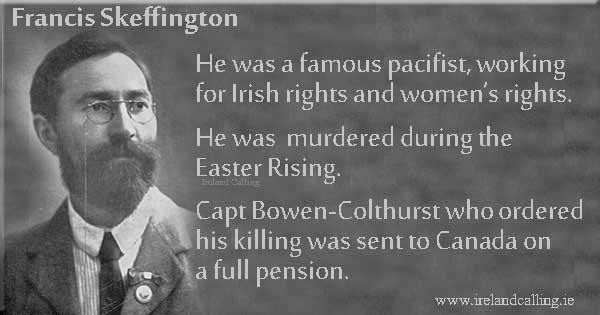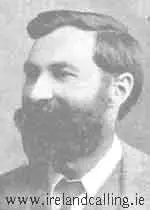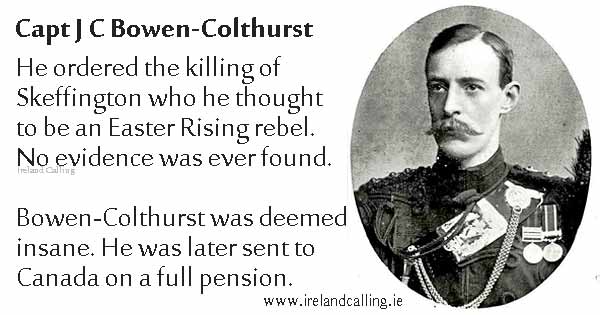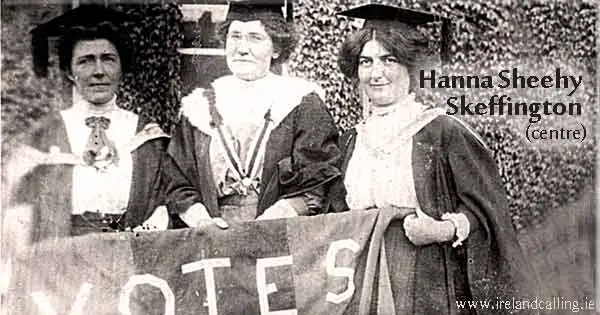Francis Skeffington was a writer and Irish nationalist who was murdered during the Easter Rising. He was born in County Down on 23 December, 1878.
Skeffington was a school friend of famous Irish writers, James Joyce and Thomas Kettle. He was passionate about women’s rights and was a regular debater and campaigner at University College Dublin. He married Hanna Sheehy and adopted her last name to become Francis Sheehy-Skeffington. He was widely known as Skeffy.

Mediated during the Dublin Lockout
Skeffington worked as a journalist and writer, and was heavily involved in numerous societies campaigning for women’s rights and for more rights for the Irish. During the Dublin Lockout in 1913, Skeffington tried to mediate a peaceful end to the stand-off between the dock workers and the factory owners.
During the trial of James Larkin, Skeffington testified that the police were violent and intoxicated towards the crowd of strikers. He stated that he had was helping a group of women tending to an injured man who had been assaulted by police officers when another policemen strode towards them with his baton raised and only stopped when Skeffy read out the policeman’s badge number aloud.
Police officers had ‘no control of their behaviour’
Skeffington went to the police station to report the incident but was insulted and verbally abused by the officers who he described as “intoxicated and in no control of their own behaviour”.

He was jailed for urging Irish men not to sign up to fight for the British Army at the outbreak of the First World War.
Skeffington was opposed to the Easter Rising in 1916. He agreed with the rebels’ cause, but did not believe a violent uprising was the correct course of action. He was at Dublin Castle on the day the Rising broke out, and witnessed a British soldier severely injured and lying bleeding on the ground. Skeffington went over to try and help, but the soldier was dragged away by other members of the British Army before he could get to him.
After a few days of the fighting, Skeffington became concerned that all sense of law and order was gone from Dublin. He tried to rally a group of civilian peacekeepers, not to broker peace between the rebels and the British, but to maintain order on the streets as crime rates had soared due to a lack of police presence.
He was arrested on Easter Monday by the British Army, presumably for breach of the peace, and when asked he said he was sympathetic to the rebels’ cause, but not approving of their methods.
Captain J. C. Bowen-Colthurst, a senior British Army officer used Skeffington as a hostage. He sent him out with his hands tied to accompany British troops on a raid on a rebel stronghold. The soldiers’ orders were make sure Skeffington was visible to the rebels, and shoot him if they showed any signs of attack.
Bowen-Colthurst attacked a tobacconist in Dublin which wasn’t a rebel stronghold or safe house. He took hostage a young boy, a politician and two journalists who had been in the shop. The boy and the politician were shot dead. The two journalists and Skeffington were held for another day before Bowen-Colthurst ordered them to be shot as well, without trial, on 26 April 1916..

A raid was carried out on Skeffington’s home, as Bowen-Colthurst tried to find some evidence that could link Skeffington to the rebels. There was none.
Bowen-Colthurst went to Canada on full pension
The news came to the attention of a senior British Army official who ordered the arrest of Bowen-Colthurst. His colleagues refused to carry out the order and Bowen-Colthurst claimed he was suffering from shock and was sent to an asylum. He was later discharged and moved to Canada on a full pension.
Hanna Sheehy-Skeffington was offered a state pension by the British government but refused.

easter-rising.html